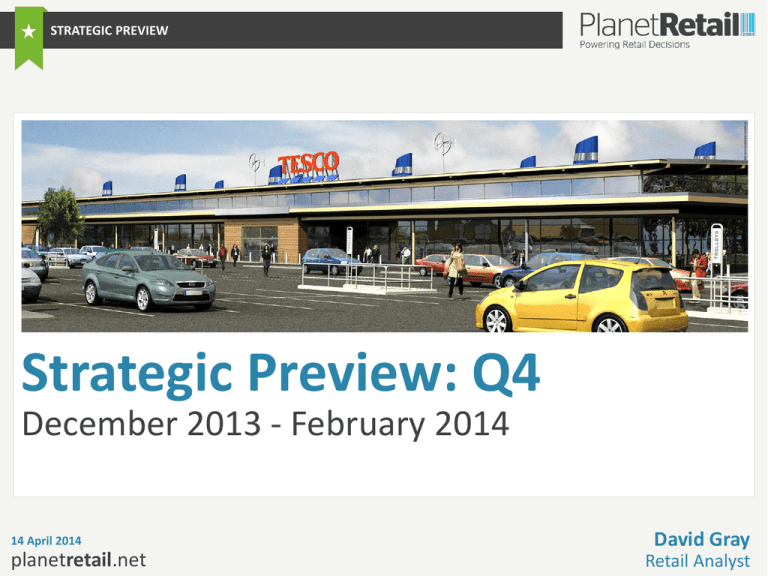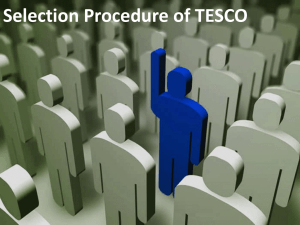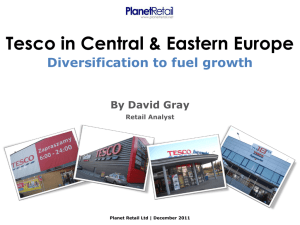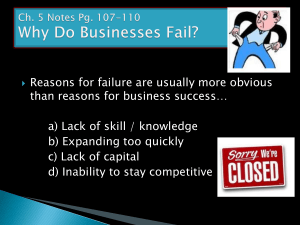Strategic Preview: Q4
advertisement

STRATEGIC PREVIEW Strategic Preview: Q4 December 2013 - February 2014 14 April 2014 planetretail.net 1 David Gray Retail Analyst Strategic Preview: Tesco Q4 1. Expectations for the Quarter 2. UK: Q4 Strategic Changes 3. Global: Q4 Strategic Changes 4. Outlook 5. What’s new at Planet Retail 2. UK: Q4 Strategic Changes Tesco is investing in permanent price reductions across core food lines. Tesco plans to invest an additional GBP200 million (USD327.7 million) in lowering prices on essential lines consumers purchase on a regular basis. This commitment will be reinforced by Tesco’s Price Promise programme. This clearly shows how seriously Tesco takes the threat posed by the hard discounters, which are increasingly threatening some of Tesco’s key customer groups. This is driven by the discounters becoming more mainstream – by (1) targeting high street locations, (2) listing more brands, (3) introducing more fresh food and (4) developing premium ranges. Tesco’s price investment also marks a fundamental adjustment in strategy as it moves away from a high-low promotional policy to one more like its arch-rival, Walmart-owned Asda and its EDLP. It is clear this method of price investment is perceived as more honest by consumers. It also reflects a growing propensity to shop little and often – which in itself requires fewer multi-buy promotions. The move, however, could also spark a price war – something that is not good for any retailer as it could drive down margins industry-wide. Rivals have already begun matching the price of products included in the investments e.g. four pints of milk. Even so, such a price war is unlikely to happen, considering it is not in retailers best interests. 3 2. UK: Q4 Strategic Changes Tesco is directing investment during FY14 into the refurbishment of the Extra format. Tesco Extra refurbishments are the number one priority in FY14, with 110 planned. A further 50 superstores, 40 Metros and 450 Express stores will be refurbished with total capex of GBP500 million (USD819 million). Plans are to complete the entire estate by 2017. Although requiring significant capex, it has the potential to drive up sales at out-of-town stores. Considering sales uplifts at converted stores are understood to be running at 3-5%, a wider roll-out will have a positive impact on sales, not to mention the long-term profitability of the format. Hypermarkets remain one of Tesco’s most profitable formats despite a slowdown in their roll-out. Tesco is experimenting with its foodservice proposition – launching a New York-style diner (Fred’s Food Construction) at an Extra store in West London. The general merchandise transformation is progressing and will be completed by autumn 2014. Tesco is anchoring ranges around family, food, cooking and home. Further work on the general merchandise transformation programme involving the adjustment of ranges away from less profitable products such as big-ticket electricals will have a positive impact on margins. It will also make Tesco’s larger stores more compelling by offering non-food products more relevant to customers on a weekly food shopping trip. To this end, ranges such as clothing – a category which is profitable and where having space instore is clearly of benefit to consumers - is being given more sales area. Electricals, by contrast, is seeing instore space scaled back. 4 Tesco is adjusting general merchandise space towards more profitable categories such as clothing and homewares. Electricals are seeing space reduced. 2. UK: Q4 Strategic Changes Tesco has pledged to improve customer service as part of the UK improvement programme. This is a key strategic objective in fiscal 2014. Tesco has committed to make productivity improvements which will free up staff to serve customers on the shop floor. Priority is being given to fresh food departments and will focus on instore service points. Further work on customer service is clearly needed considering this remains one of the key methods the Big Four grocers use to differentiate themselves from hard discounters. Price alone is not the answer. Customers also want service and a positive overall shopping experience. However, even among the mainstream grocers – competition is fierce – with Tesco’s rivals such as Sainsbury’s and Waitrose arguably providing better service. Clearly further investment from Tesco will be necessary. Tesco’s decision to focus staffing on highly frequented categories such as fresh fruit & vegetables is a sound strategy – giving customer service improvements the widest possible impact. Nevertheless, it is unclear which productivity improvements Tesco will be making in order to free up staff. It may be a case of giving with one hand and taking away with the other. So far no additional investment has been committed in this area. 5 Tesco has pledged to put more staff on the shop floor in core categories such as fruit & vegetables. More staff are needed considering the poor availability in the category in some stores (above).











